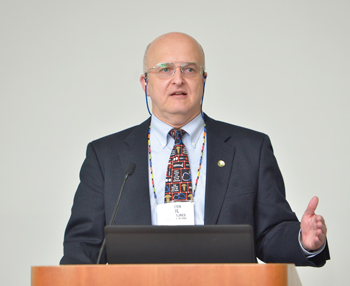Letter to the editor: politics and patient care
Readers respond to recent coverage about ACP advocacy and its direct impact on patient care.
I saw a patient today who suffered herpetic encephalitis 10 years ago and who has subsequently divorced, has become bankrupt, and is now diagnosed with adenocarcinoma/pseudomyxoma of the appendix. Caring for such a person during her illness is the kind of struggle to which doctors need to apply their minds.
A big problem for doctors to wrestle with is unrealistic expectations. Global warming and utopias, as discussed in the President's Message by Nitin S. Damle, MD, MS, MACP, in the April 2017 ACP Internist, are not in a doctor's black bag, nor should they be. All of Dr. Damle's talk about political issues does nothing to advance the art and science of medicine. It advances the political purposes of ACP perhaps to create and satisfy this interest group or that interest group. That is not going to help a doctor get out of bed at 1 a.m. to go to the hospital to care for the patient with sudden critical illness. That illness, and the doctor's struggle to help, is not caused by global warming at all.
I am a faithful member of ACP. I respect Dr. Damle for serving as President and thank him for that. But this essay is not going to encourage men and women to be better doctors.
Robert H. Kelly, MD, FACP
Fort Worth, Texas
Dr. Damle, Immediate Past President, responds: I couldn't agree more about the value of the individual doctor-patient relationship and the importance of strengthening this bond by ensuring adequate time with patients, listening to their stories, being there when they need us most, making the correct diagnosis, and instituting the correct treatment. I noted this in my column and also noted that the College has been at the forefront of creating a culture where this doctor-patient relationship thrives. The College strives to reduce administrative burdens, promote evidence-based high-quality and cost-effective care, and support the use of only essential outcomes-based quality measures in evaluating physicians' performance.
In addition, the College needs to be a voice on public health issues by outlining the health effects of global climate change, protecting patients against gun violence, identifying the social determinants of health, and protecting and caring for our most vulnerable patients such as the elderly, the frail, and the poor. Further, we need to protect our patients and colleagues from the risk of discrimination based on race, ethnicity, gender, sexual identity, or orientation.
The College has impact and influence not only through its educational efforts but also through its ethical and professional standards and its advocacy for patients and physicians. ACP needs to engage in dialogue on legislative, ethical, educational, and societal issues to be an organization that is respected and sought by legislators, policymakers, the business community, and society leaders for balanced, nuanced, and responsible positions that are in the best interests of our patients and profession.
I think if we can minimize chronic disease, reduce the cost of health care, practice evidence-based medicine, promote the joy of the patient-doctor relationship, and help patients lead healthy lifestyles, then we have helped doctors to provide the best possible care and to lead fulfilling professional and personal lives.



